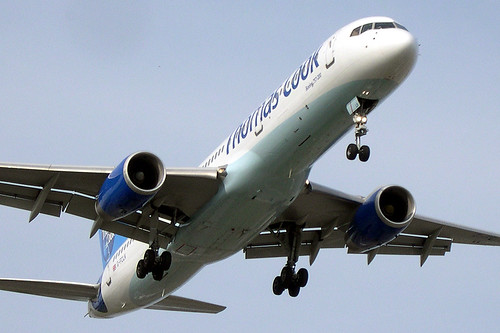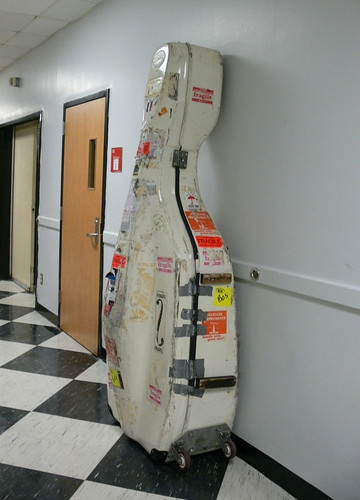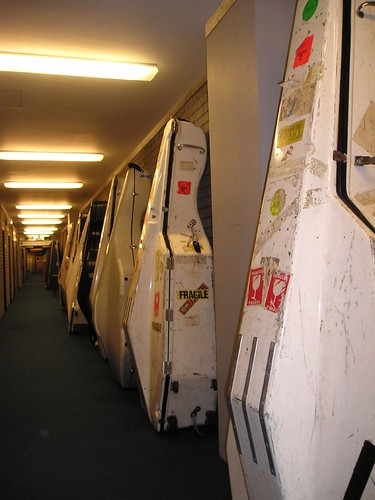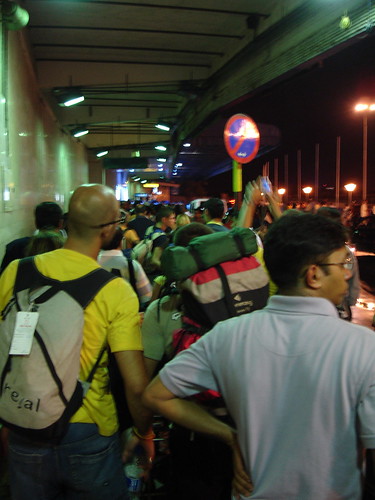Traveling with a bass is an annoyance by cab and an irritation by train, but the real drama occurs when we intrepid (or foolhardy) bassists venture out to our nearest airport to load our instruments on a plane.
After all, most long distance travel is really not practical (or often even possible) without the use of a plane, and the life of a musician often necessitates frequent flights, whether for touring, auditions, or long-term voyages from one part of the world to another.
And honestly, we bastions of the low end have pretty much figured out the best ways to take a bass on a plane. We can strap it into bulkhead seats or use one of several available flight cases to get our instrument from place to place.
Even though our instruments are massive (massively awesome, I like to say), they really aren’t that much bulkier than many of the other items people bring onto an airplane. Ever see a group people in line with surfboards, a few suitcases, some carry-on baggage and a couple of infants? I definitely have. Although its overall mass may be somewhat larger, there’s no way that my bass in a flight case (with wheels and rails built in for easy loading and unloading) will cause more problems for the airlines than those surfboards, golf clubs, and ski poles.
No, the big problem when traveling on planes with a bass isn’t the bass itself.
It’s the people working for the airlines.
Any single airline worker can easily turn our trip with a bass from a minor headache to a major nightmare. Workers at the ticket counter usually have no idea what a bass is, whether it is allowed on the plane, and if so, what sort of additional fees (if any) there are. Regulation books are flipped through, phone calls are made, and co-workers are called over, all to determine how to handle this strange person wanting to bring this strange white case onboard the plane.
- Sometimes it is considered oversized – Fee #1
- Sometimes it is considered overweight – Fee #2
- Sometimes it is considered oversized and overweight – Fee #1 and 2
- Sometimes it is not allowed onboard at all
I have quite frequently (even in recent years) walked on without paying an extra fee at all. I have walked on paying $40, $80, or $100 for each leg of the trip. I have had friends who have had to pay $160 for each leg of the trip. And I have had friends who were told (often after clearing the instrument for air travel over the phone with the corporate office) that they could not fly under any circumstances.
Years ago, bassists could simply buy a second ticket and strap the bass into a seat, avoiding much of the hassle described here. Years passed, and basses began to be restricted to bulkhead seats in the front of the plane, then only to first class seats. Eventually, more and more airlines began to completely forbid the instrument in the passenger seating area, relegating it to the cargo hold in the traditional ‘bass coffin’ case.
Fees began to grow and grow, and more and more bass players began to relate stories of not being allowed on the plane at all with the bass, cargo hold or no. If they were allowed on, the fees assessed varied wildly, from no fee whatsoever to hundreds of dollars for each leg of the flight.
Our general post-9/11 travel paranoia has made it 10 times more difficult to travel with a bass by plane. I am thankful that I did most of my travel via plane last millennium. I basically refuse to fly with my bass unless I am part of a tour and not responsible for walking it through security.
They hold all the cards. We hold none of them. The “heightened security” world that we now live in only makes things harder. Better not get irate at the impenetrably dense airline worker telling you that you can’t check your bass—you just might be a terrorist.
____________
3:45 a.m. Monday morning, January 2000
My alarm began its hateful ‘beep beep beep’, jolting me rudely out the half-slumber that I had fallen into only a couple hours earlier. Time to get ready to take the bass on a plane!
I showered and shaved, stuffing my toiletries into a small bag alongside my folding stool (I had this whole bass travel thing worked out) and begin to pile all of my bags next to the front door of my second story apartment.
I would have happily left my bass in the car despite living in a somewhat sketchy area, but it was the middle of winter and I didn’t feel like subjecting my bass to the bitter seasonal cold of Chicago. Even though I had done it countless of times before, this crazy pre-flight routine never failed to conjure up a tight, greasy knot in my stomach. Flying with the bass stinks, no matter how you cut it.
I opened up the front door, trying my best not to bang my big white whale of a case into the side of the building and wake up my neighbors. I had opened the trunk the night before, finding to my alarm that a bunch of spiders had made their home in my case. Now everything smelled like Raid from killing the bugs, but at least I didn’t have to worry about spider webs in the body of the instrument.
I clunked my way down the stairs, images of making one false move and pitching head over heels with the trunk vivid in my mind. I scooted the heavy fiberglass monstrosity down the stoop, through the gate, and into the chilly pre-dawn winter air.
My trusty Ford Escort (fast approaching 200,000 miles, just like any self-respecting freelance musician’s vehicle) was parked in–typical for this neighborhood. Ever try to load a seven foot tall heavy box into a tailgate with a car parked less than a foot from your bumper? It’s not fun. After much bumping and grinding, I got the case into my tailgate and shoved it all the way into the car.
Ever ride in a small station wagon with a seven foot tall bass case? It’s….well….cozy might be one way to describe it. This case would rest just above the gearshift of my car, squishing me onto the left side of my seat and making shifting very challenging.
By 4:30 a.m., I was on my way to the airport, and I grinned, knowing that I was also well ahead of the Chicago morning rush hour. One realizes how easy it is to actually get around this city when there aren’t any other cars, zipping without obstruction onto Lake Shore Drive, then merging onto the Stevenson Expressway on my way to the airport. Although being squished up against my door probably looked peculiar to any passing vehicles, I had mastered the art of DWCB (driving while carting a bass), and I knew that I’d have no trouble getting to the airport.
I pulled into the economy lot of the airport, quite a distance from the terminal itself, and began scanning the parking lot for the next available shuttle bus. This multi-step process was one of the reasons why I left so early for the airport. One never knows how long any of these steps would take, and having a seven foot tall coffin-like container doesn’t exactly speed up any of these steps.
A shuttle bus came around after a few minutes, and I got on, trying to lightheartedly brush off the incredulous comments I got from my fellow shuttle travelers.
What’s that thing?
It’s HUGE!
Where are you going with that?
Can you really fit that on the plane?
…….plus the inevitable “betcha wished you played the flute/piccolo/violin/harmonica” comments that we always get everywhere.
What non-bass players may not realize is what a toll moving this case (plus our regular luggage and, in my case, a metal collapsible stool) takes on our body. I have never finished a bass-on-plane experience without several scratches on my hands and arms (from fiberglass, metal latches), plus bruises (banging your body awkwardly against the case when moving it, holding it up on a shuttle, or moving it up and down stairs), and general muscular soreness from toting heavy bags on one side of the body and a giant heavy case on the other side. This isn’t a great situation if you have to play an audition only a few hours after landing.
After departing from the shuttle bus, I slung my bags over my shoulder and began to wheel this case toward the ticket counter, dreading the upcoming encounter.
Pre-9/11, I had devised a tactic that seemed to avoid many excess baggage fees. Before getting in line to check my luggage, I would park my bass near the line, next to a pole, and get in line without it. I think that the sight of a bass player banging into things and awkwardly making their way through the line with bags and a giant case raised a big red flag in the eyes of the counter workers.
Instead, I would stand in line with just my regular luggage. After checking in and putting my other luggage on the conveyer belt, I would say,
“Oh, one more thing….I’m traveling with a double bass, so I need one more baggage check sticker. It’s over there by the pole.”
About half of the time, the counter worker would simply print one out for me (no questions asked) and get some workers to wheel it through a side door—no excess baggage fees whatsoever.
The rest of the time, unfortunately, the counter worker’s brow would furrow, and they’d tell me that I’d better go get that case and bring it up to them.
That’s when I knew I would be running into trouble.
___________
The enormity of the bass flight case always became clear when I got it up to the ticket counter, and the employees were usually already ruffling through regulation manuals, trying to determine how to handle this situation. Now, I know that basses aren’t checked as baggage as often as skis or surfboards, but one would imagine that policies governing this sort of thing would be in place for more airlines.
If such policies are in place, they certainly aren’t getting through to the ticket counter workers, because nobody ever seems to have any idea what is going on when I approach with my big white whale of a trunk.
Post 9/11, leaving my suspiciously large case by a structural pole and then walking off would almost certainly trigger some alert of some sort, so I imagine that wheeling it through the crowded, snaking line is the only option.
How did the audition go? Read Auditioning is a Rotten Pastime to find out, and stay tuned for more stories of life on a plane with a bass.
______________
Next time on Basses, Planes, Trains, and Automobiles: Learn all the interesting ways in which basses can be destroyed by baggage handlers, and find out just how fun (or not fun) it is getting reimbursed for damages.
Read the complete series:
Bass News Right To Your Inbox!
Subscribe to get our weekly newsletter covering the double bass world.







Hi Jason, nice post. Funny how the flight cases all start looking the same after a little while. That shot of the lone Gage case looks just like the one I have been using, owned by Dan Greenspan (fantastic Cambridge, MA-based bassist). It even has repairs in the same places. Scary. Hey, the getting on a plane part is pretty rough – what about the arrival and pickup stories – I have a few, and I’m there is no shortage of other stories out there.
Thanks,
Rick McLaughlin
I’m all to familiar with the problems of transporting a guitar. Numerous confrontations with officials, and even on one horrifying occasion, the airline managed to loose Robin’s guitar. (in the time when you were unable to take them on board due to security alerts…)
The very thought of trying to do all that with a bass brings me out in a cold sweat.
I still use the “leave the trunk behind a pole/trash can” technique when checking in. As long as it’s close to the check-in line and I can keep my eye on it, I’ve had no problem with security. Also, Northwest has recently placed “cello/bass on pg. 87-88 of their “special items” list of checked baggage. They will take a bass trunk for $80, regardless of weight, which to me is better than not knowing what you may be charged or if the airline will check it at all. The baggage policy can be downloaded from the AFM website under “tips for airline travel/links to individual airlines,” and I would recommend bringing a copy with you to the check-in counter. Hope this helps anyone travelling in the near future.
Hey Jason,
I am looking to buying a bass trunk. Possibly a good follow up post would be a good discussion on some of the new bass trunks out. It is hard to find a good balance between price/quality. Especially because there seem to be quite a few new trunks out there.
Thanks,
Ben
Ew, planes… Every time on MYA’s China/Korea trip when something bad happened to the basses at the airport, Drew and I were thinking, “Yeah, Jason.” 🙂 Especially all those times that someone told us to play piccolo or something. x_x